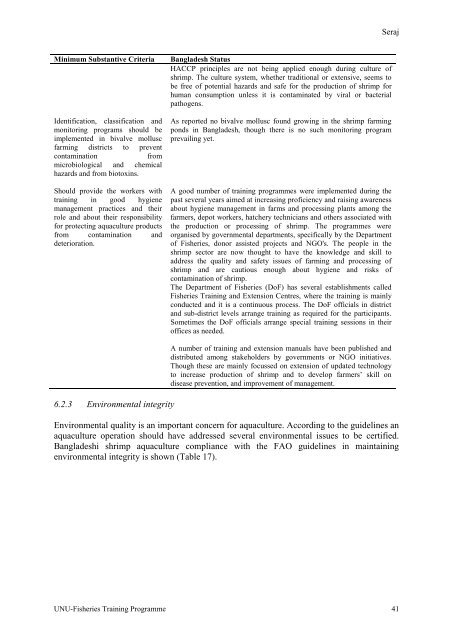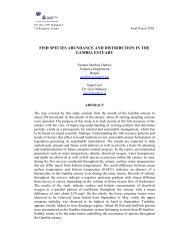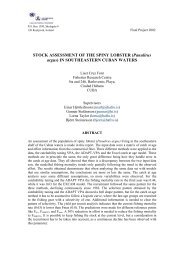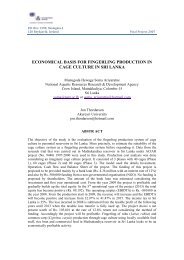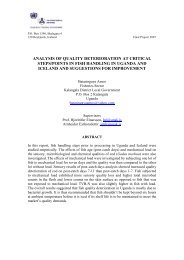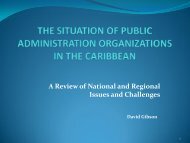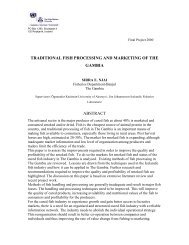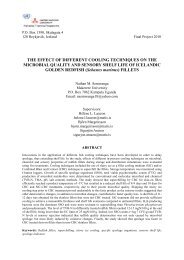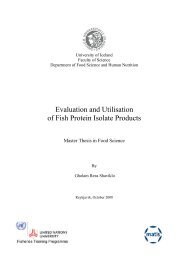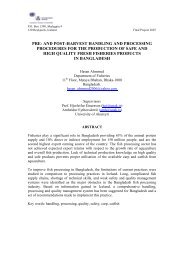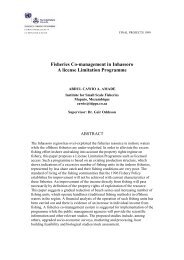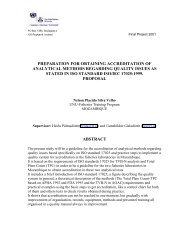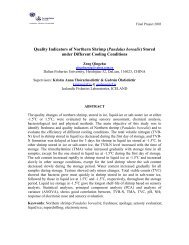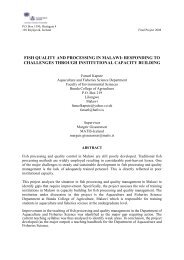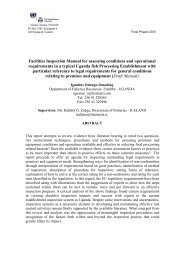a compliance study of Bangladesh shrimp aquaculture - The United ...
a compliance study of Bangladesh shrimp aquaculture - The United ...
a compliance study of Bangladesh shrimp aquaculture - The United ...
Create successful ePaper yourself
Turn your PDF publications into a flip-book with our unique Google optimized e-Paper software.
SerajMinimum Substantive CriteriaIdentification, classification andmonitoring programs should beimplemented in bivalve molluscfarming districts to preventcontaminationfrommicrobiological and chemicalhazards and from biotoxins.Should provide the workers withtraining in good hygienemanagement practices and theirrole and about their responsibilityfor protecting <strong>aquaculture</strong> productsfrom contamination anddeterioration.<strong>Bangladesh</strong> StatusHACCP principles are not being applied enough during culture <strong>of</strong><strong>shrimp</strong>. <strong>The</strong> culture system, whether traditional or extensive, seems tobe free <strong>of</strong> potential hazards and safe for the production <strong>of</strong> <strong>shrimp</strong> forhuman consumption unless it is contaminated by viral or bacterialpathogens.As reported no bivalve mollusc found growing in the <strong>shrimp</strong> farmingponds in <strong>Bangladesh</strong>, though there is no such monitoring programprevailing yet.A good number <strong>of</strong> training programmes were implemented during thepast several years aimed at increasing pr<strong>of</strong>iciency and raising awarenessabout hygiene management in farms and processing plants among thefarmers, depot workers, hatchery technicians and others associated withthe production or processing <strong>of</strong> <strong>shrimp</strong>. <strong>The</strong> programmes wereorganised by governmental departments, specifically by the Department<strong>of</strong> Fisheries, donor assisted projects and NGO's. <strong>The</strong> people in the<strong>shrimp</strong> sector are now thought to have the knowledge and skill toaddress the quality and safety issues <strong>of</strong> farming and processing <strong>of</strong><strong>shrimp</strong> and are cautious enough about hygiene and risks <strong>of</strong>contamination <strong>of</strong> <strong>shrimp</strong>.<strong>The</strong> Department <strong>of</strong> Fisheries (DoF) has several establishments calledFisheries Training and Extension Centres, where the training is mainlyconducted and it is a continuous process. <strong>The</strong> DoF <strong>of</strong>ficials in districtand sub-district levels arrange training as required for the participants.Sometimes the DoF <strong>of</strong>ficials arrange special training sessions in their<strong>of</strong>fices as needed.6.2.3 Environmental integrityA number <strong>of</strong> training and extension manuals have been published anddistributed among stakeholders by governments or NGO initiatives.Though these are mainly focussed on extension <strong>of</strong> updated technologyto increase production <strong>of</strong> <strong>shrimp</strong> and to develop farmers’ skill ondisease prevention, and improvement <strong>of</strong> management.Environmental quality is an important concern for <strong>aquaculture</strong>. According to the guidelines an<strong>aquaculture</strong> operation should have addressed several environmental issues to be certified.<strong>Bangladesh</strong>i <strong>shrimp</strong> <strong>aquaculture</strong> <strong>compliance</strong> with the FAO guidelines in maintainingenvironmental integrity is shown (Table 17).UNU-Fisheries Training Programme 41


